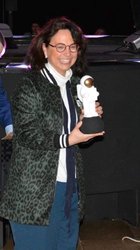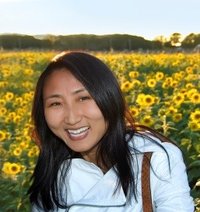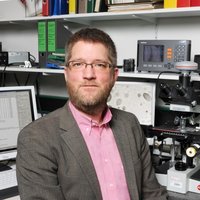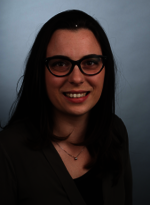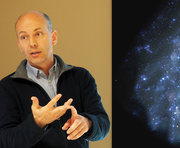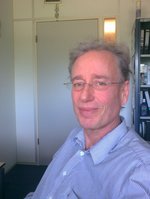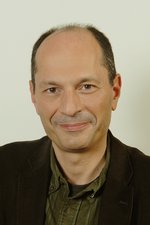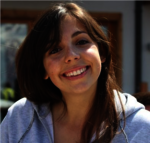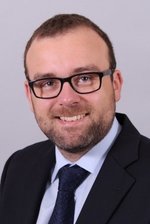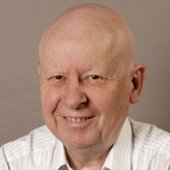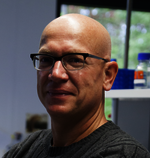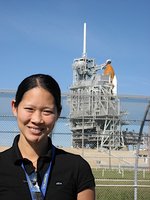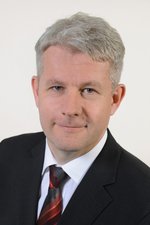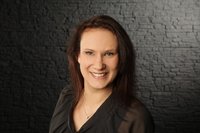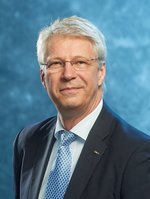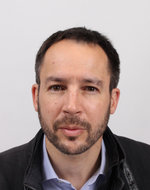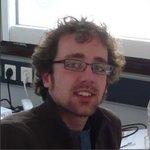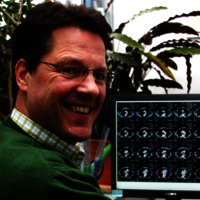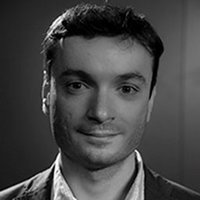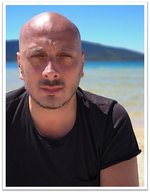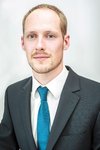FACULTY OF ESA-FAIR SPACE RADIATION SCHOOL - 2019
Dr. Sarah Baatout
Trainer’s name: Prof. Sarah Baatout
Trainer’s position: Head of Radiobiology Unit, Belgian Nuclear Research Centre, Mol, Belgium
Trainer’s email and phone number: sbaatout@sckcen.be; +32 14 33 27 29
Prof. Sarah Baatout is head of the Radiobiology Unit at SCK•CEN, Mol Belgium as well as guest professor in space and radiation biology in 3 Belgian Universities (Gent, Namur and Leuven). She has a longstanding expertise in radiobiology, space biology and radiation medicine and has been involved in 20 experiments in space (FOTON, ISS) or in space analogs (bed rest, Antarctica). She went to Antarctica in 2017-18 to conduct health research. She is a member of the European Space Science Committee and of the Human spaceflight and Exploration Science Advisory Committee of ESA. In 2018, she was awarded the “BeSpace personality of the year” title. She is the co-author of 130 peer-reviewed articles.
Dr. Mei Bai
Trainer’s name: Dr. Mei Bai
Trainer’s position: Head of Accelerator Operations, GSI
Trainer’s email and phone number: m.bai(at)gsi.de
Scientific degrees: PhD of Physics, Indiana University, 1999
Previous positions: Scientist, Brookhaven National Laboratory (1999-2014), Director of IKP-4, Forschungszentrum Juelich (2015 – 2017)
Professorship: Experimental Physics (W3), University Bonn
Current position: Head of Accelerator Operations Division, GSI
Research field and interest:
• Beam physics including spin dynamics
• Accelerator technologies, such as beam and spin manipulations, novel beam diagnostics and controls
• Application of accelerator technology and beams
Dr. Thomas Berger
Trainer’s name: Dr. Thomas Berger
Trainer’s position: Head Biophysics Group; Radiation Biology Department; Institute of Aerospace Medicine
German Aerospace Center (DLR), Cologne, Germany
OrcidID: orcid.org/0000-0003-3319-5740
Trainer’s email and phone number: thomas.berger(at)dlr.de; +49 2203 601 31
Dr. Thomas Berger studied physics at the Technical University of Vienna (TUW), Austria and graduated with a PhD in radiation physics in 2003. In 2003 he joined the German Aerospace Center (DLR), Institute of Aerospace Medicine were he became leader of the Biophysics Research Group in 2009. At DLR his main research topic is radiation protection including the development of radiation detectors as well as investigations for the radiation load received by humans for missions beyond Low Earth Orbit (LEO). He is currently the Principal Investigator (PI) for the DOSIS 3D experiment aboard the International Space Station (ISS) and the Matroshka AstroRad Radiation Experiment (MARE) project which will fly on NASA´s Orion Exploration Mission 1 (EM-1) to the Moon.
Dr. Daria Boscolo
Trainer's name: Dr. Daria Boscolo
Trainer’s position: Postdoc Researcher GSI, Biophysics department, Dramstadt, Germany
Trainer’s email and phone number: d.boscolo(at)gsi.de; +49 6159 3052
Dr. Daria Boscolo studied Physics at the Pisa University. She graduated in 2018 with a PhD (Dr. rer .nat) from the Technische Universität Darmstadt hosted by the Biophysics department of GSI, Darmstadt.
Her research focused on radiation chemistry and ion track structures codes, with the goal of understanding the nanoscopic mechanisms involved in the radioresistance of hypoxic tumors.
Since 2018 she joined, as a PostDoc researcher, the group of Space Radiation Physics in the biophysics department of GSI where she investigates new compositions and structures of shielding materials for best possible protection of humans against high energy Galactic Cosmic Rays.
Dr. Giuseppe Correale
Tainer’s name: Dr. Giuseppe Correale
Trainer’s position: ESA Science Coordinator within the Human Research Office
Trainer’s email and phone number: Giuseppe.correale(at)esa.int, ,+31 681351055
• Dr. Giuseppe Correale obtained his Bachelor of Science at Naples University and MSc and PhD at TUDelft.
• He then worked 10 years in R&D companies developing high-tech plasmas to the benefit of research field ranging from engineering to medicine.
• Since 2016, he works as a Human Research Officer, managing human physiology experiments performed within all the ESA sponsored platforms.
Dr. Christophe Carreau
Trainer’s name: Christophe Carreau
Trainer’s position: Scientific Visual & Graphical Production Coordinator, Science & Exploration Directorate, European Space Agency
Trainer’s email and phone number:christophe.carreau(at)esa.int, +31 565 4041
Christophe Carreau is responsible for the graphical production of the scientific missions of the European Space Agency. Be it the visualisation of satellites in space and their journey into our solar system, the visualisation of the astrophysical phenomena in the Universe, or the development of the astronomy images taken by onboard cameras, Christophe Carreau seeks to popularise and share with the general public what is today within reach of all.
Christophe Carreau has been involved in the last 15 years in some of the most successful communication campaign for the Agency, like PLANCK in 2010 or Rosetta in 2014. Christophe Carreau is also keen on vulgarising scientific topics to the general public. He is producing and giving talks about Rosetta, astronomy, the formation of our solar system and the evolution of the rocky planets.
Dr. Matthias Dieckmann
Trainer’s name: Dr. Matthias Dieckmann
Trainer’s position: Nominated integrated support for ESA’s Space Radiation Research Programme for the Deep Space Gateway
Trainer’s email and phone number:matthias.dieckmann(at)esa.int; Telephone: 0031-71-565 4601
Dr. Matthias Dieckmann graduated with a diploma in crystallography form the University Hamburg in 1988, after his three years of work at the Philips Research Lab in Hamburg on garnet lattice constant adjustments, appropriate for bubble memory substrates. His High Temperature Superconductor (HTC: Y1Ba2Cu3O6.8) related substrate development for thin films, with dedicated skull melting/crucible free processing methods, lead to the diploma for producing HTC-substrates, titled: “Phase compositions in the system Gadolinium-Alkaline-Earth-Manganese-Oxides, as function of the oxygen contend in the growth atmosphere and the calcium concentration in the melt”. After orientating studies with DNA-intercalating molecules, as doxorubicin at the University Hamburg and the European Molecular Biology Laboratory, he started his doctorate work and completed it in 1994 with the dissertation: “Light scattering examination during the crystallisation of lysozyme and on dedicated dynamic systems”. His application as a young graduate trainee for ESA, lead immediately to the recruitment as “post of physics” in ESTEC’s technology directorate, during which he supported various space flight projects for Spacelab, Spacehab and the International Space Station. Now he supports the directorate of Human and Robotic Exploration Programmes as nominated integrated support.
Trainer's name: Marco Durante
Tainer's position: Director, Biophysics Department, GSI Helmholtzzentrum für Schwerionenforschung
Professor of Physics, Technische Universität Darmstadt, Germany
Trainer's position Email and phone number: m.durante(at)gsi.de, marco.durante(at)physik.tu-darmstadt.de, tel. +49 6159 71 2009
Marco Durante got his Ph.D. in Physics in 1992 at the University Federico II in Italy, and has dedicated his research efforts to the biophysics of high-energy charged particles, with applications in cancer therapy and space radiation protection. He is generally recognized as world leader in the field of particle radiobiology in therapy and space and is co-author of over 300 papers in peer-reviewed scientific journals (h-index=44) and one patent on proton therapy. He is currently chair of the ESA Life Sciences Advisory Group, corresponding member of the ICRP TG115 on dose limits in space missions, member of HESAC and former chair of the ESA Topical Team on Space Radiation. He is also vice-chair of the Particle Therapy Co-Operative Group (PTCOG) and was President of the International Association for Radiation Research (IARR) from 2011-15. Prof. Durante has been awarded several prizes for his contributions to charged particle biophysics, including the 2004 Galileo Galilei Award in Medical Physics, the 60th Timofeeff-Ressovsky medal by the Russian Academy of Sciences, the 8th Warren K. Sinclair Award of the US National Academy of Sciences, the 2013 IBA-Europhysics Award for Applied Nuclear Science and Nuclear Methods in Medicine (European Physics Society) and the 2013 Bacq & Alexander award of the European Radiation Research Society (ERRS).
Dr. Martina Giraudo
Trainer’s name: Dr. Martina Giraudo
Trainer’s position: Radiation and Plasma engineer at Thales Alenia Space
Trainer’s email and phone number: martina.giraudo(at)thalesaleniaspace.com; 0039 340 30 49 820
As a Nuclear Engineer, Dr. Giraudo has been working within the field of Space Radiation Protection for 6 years, in the framework of major Space Infrastructures, Transportation Systems, Exploration, Scientific Satellites and R&D programs. She has been technically supporting programs and projects in an international contests and she has been managing R&D studies (FP7, European and Italian Space Agencies studies, Internal R&D). At the same time Dr. Giraudo attended a PhD program in Physics, focusing on high energy radiation interactions with matter in space.
Dr. Alexander Helm
Trainer’s name: Dr. Alexander Helm
Trainer’s position: Postdoc Researcher GSI, Biophysics department, Dramstadt, Germany
Trainer’s email and phone number: a.helm@gsi.de, +49 6159 71 3031
Dr. Alexander Helm graduated with a PhD in biology from Technical University of Darmstadt in 2013. He has been working in radiobiology since 2009, starting his career at GSI’s biophysics department. Alexander Helm was selected as a participant of the NASA Summer School in 2012, held at the Brookhaven National Lab in the US. From 2016 to 2018 he served as a postdoc at the Proton Therapy facility in Trento, Italy. Since December 2019 he has a postdoc position back at GSI. His research activities have been cardiovascular damage of radiation, cytogenetics and cancer therapy among others. His current research focus is immunomodulatory effects of ionizing radiation, especially of particle radiation.
Felix Horst
Trainer’s name: Felix Horst
Trainer’s position: PhD student
Trainer’s email and phone number: f.horst(at)gsi.de; +49 6159 71 1791
Felix Horst studied Biomedical Engineering and Medical Physics at the THM University of Applied Sciences in Giessen and has experiences in radiation protection, shielding calculations, neutron dosimetry and radiotherapy physics.
Since 2016 he is working on his PhD in the Space Radiation Physics group of the Biophysics Department at GSI on experiments where nuclear fragmentation cross sections for light and heavy ions in the intermediate energy range are measured. He was participating at the 2016 NASA Space Radiation Summer School held at Brookhaven National Laboratory.
Dr. Gerhard Kraft
Trainer’s name: Dr. Dr.h.c. Gerhard Kraft
Trainer’s position: em. Helmholtz Prof.
Trainer’s email and phone number: g.kraft(at)gsi.de; +49(0)6159- 2607
Physics education at the University of Heidelberg 1961 to 1967 in nuclear physics and at the University of Cologne in nuclear solid state physics Ph.D ( 1972) : energy loss of Carbon ions in solids. Since 1973 at GSI: first, department of atomic physics 1975: first experiments at the new accelerator UNILAC: x-ray emission from super heavy elements. In parallel, first radiobiology experiments in cooperation with the space radiobiology group Frankfurt /Cologne and the biophysics groups at Giessen and Siegen.1980 at LBL Berkeley. After return, radiobiology experiments at MPIK at Heidelberg, LBL at Berkeley, GANIL at Caen and UNILAC & SIS at GSI in preparation of ion beam therapy: Carbon ions emerged as an optimal projectile for therapy.
In parallel development of the pencil beam scanning as a novel technique to obtain the ultimate conformity to the target in ion beam therapy.
1997 start of patient treatment at GSI in cooperation with Radiology and DKFZ, Heidelberg and FZ Dresden. In total 440 patients treated until 2008 suffering from tumors in head and neck, along the spinal cord and in the pelvic region. Using the novel technique of raster-scanning for the first time, the target dose could be increased and dose to normal tissue minimized. For most tumor indications a 5 year control rate of 80% to 100% could be reached. In consequence, heavy ion tumor therapy projects started at Heidelberg and Marburg in cooperation with GSI.
G. Kraft was regularly teaching biophysics and basic physics at the TU Darmstadt. He wrote more than 200 reviewed articles and contribution to books.
After retirement, still active in project on the genetic reactions and the anti-inflammatory action of ionizing radiation (GREWIS) where he was responsible for the construction of a radon exposure set up for cell cultures and small animals. Gerhard Kraft is a member of the German Physical Society ( DPG), the German Society of Radiation Research (GBS) and since 2018 honorary president of the European Society for Radiation Research ( ERRS).
Among others he received the following awards:
Erwin Schrödinger award of the Helmholtz Community in 1999
Otto Hahn award of the city of Frankfurt in 2000
Bacq and Alexander award of the European Radiat. Res. Society in 2006
Order of merit first class of the Federal Republic of Germany,
Dr. h.c. honorary promotion at Justus Liebig University, Giessen in 2008
Since 2009 Helmholtz Professor for radiation biophysics at GSI
Dr. Markus Löbrich
Trainer’s name: Markus Löbrich
Trainer’s position: Professor
Trainer’s email and phone number: lobrich(at)bio.tu-darmstadt.de; +49-6151-16 24620
Markus Löbrich graduated with a PhD in Biophysics from the Justus-Liebig-University in Gießen in 1993. He started his career as a postdoc at the Lawrence Berkeley National Laboratory in Berkeley, CA, USA, where he worked on differences in the mechanisms of DNA double-strand break repair between various radiation types. After his return to Germany and promotion to Associate Professor in 1999, he focused his work on understanding the effects of low dose irradiation. Since 2007, he is employed as a Full Professor at the Darmstadt University of Technology, studying how the understanding of DNA repair processes can help to improve radiation therapy.
Dr. Marjan Moreels
Trainer’s name: Dr. Marjan Moreels
Trainer’s position: Scientist at Radiobiology Unit, Belgian Nuclear Research Centre, Mol, Belgium
Trainer’s email and phone number: mmoreels(at)sckcen.be; +32 14 33 28 16
Dr. Marjan Moreels obtained her PhD in Biomedical Sciences at the University in Hasselt, Belgium in 2006. Afterwards she was enrolled in a post-doc position at the same University. In 2010, she joined the Radiobiology Unit of SCK•CEN. Currently, she is involved in the coordination of different space projects thereby investigating the impact of space (simulated) conditions such as weightlessness and cosmic radiation on human health. She has the know-how and expertise in planning and analyzing different types of space biology experiments including ground-based in vitro/in vivo experiments using space simulated platforms as well as ISS space flight experiments.
Dr. Dr. Thu Jennifer Ngo-Anh
Trainer’s name: Dr. Dr. Thu Jennifer Ngo-Anh
Trainer’s position: ESA SciSpacE Team Leader
Trainer’s email and phone number:Jennifer.Ngo-Anh(at)esa.int; 0031715658609
Dr. Dr. Thu Jennifer Ngo-Anh is the Team Leader of the European Space Agency's SciSpacE (Science in the Space Environment) team. As such she coordinates human research, biology and physical sciences experiments studying the effects of microgravity and the space environment on various systems, using various ground-based as well as the International Space Station. Thu Jennifer Ngo-Anh studied human medicine in Tübingen, Germany and obtained her PhD in neurosciences at the Oregon Health Sciences University in Portland, Oregon and joined the Agency in 2006.
Dr. Radek Pleskac
Trainer’s name: Dr. Radek Pleskac
Trainer’s position: FAIR/APPA coordinator for BIOMAT project
Trainer’s email and phone number: R.Pleskac(at)gsi.de, +49-6159-71 2432
Radek Pleskac obtained his PhD in nuclear physics at the Charles University in Prague, the Czech Republic in 2003. His work was devoted to experimental study of properties of hot and dense nuclear matter created during relativistic heavy-ion collisions within the TAPS and HADES scientific program.
In 2004 he was awarded with a EURATOM fellowship for 2-years stay at GSI Darmstadt to measure selected spallation cross-sections at FRS (Fragment Separator) relevant for future accelerator driven systems.
In 2007 he moved to the biophysics department at GSI Darmstadt and his fields of interest was experimental study of nuclear fragmentation processes relevant for space research and tumour therapy. He was a person of charge for the FIRST (Fragmentation of Ions Relevant for Space and Therapy) experiment performed in 2011 and also for the irradiation facility in cave A.
Since 2013 he is the resource and technical coordinator for the BIOMAT project within the APPA pillar. He coordinates planning and realization of the BIOMAT experimental facility at future FAIR.
Dr. Felicitas Rapp
Trainer’s name: Dr. Felicitas Rapp
Trainer’s position: Postdoc Researcher GSI, Biophysics department, Dramstadt, Germany
Trainer’s email and phone number: f.rapp(at)gsi.de; +49 6159 71 1872
Dr. Felicitas Rapp is a biotechnologist and graduated in 2013 with a PhD from University of Leipzig, Germany. During her thesis, she started to work in an ESA funded project about space radiation effects on brain tissue. At her first PostDoc position, she focused on an ex vivo glioblastoma test system for personalized chemo-radiotherapy treatments. In 2015, she took a PostDoc position at GSI, Darmstadt, where she investigates low-dose effects on bone metabolism and immune system. She was participant of the NASA summer school in 2017. Since 2018, she is PI of an ESA funded project, which is based on her earlier work, and tries to find out how radiation-induced neuroinflammation can be mitigated.
Dr. Thomas Reiter
Trainer’s name: Dr. Thomas Reiter
Trainer’s position: ESA Interagency Coordinator and Advisor to the Director General, Astronaut
Trainer’s email and phone number:Thomas.reiter(at)esa.int
Dr. Thomas Reiter was born on 23 May 1958 in Frankfurt/Main. He holds a Master’s degree in Aerospace Technology and a honorary doctorate from the German Armed Forces University in Neubiberg/Munich. He was appointed Brigadier General in March 2009.
Thomas Reiter graduated from the Federal Armed Forces University in Neubiberg in 1982. On concluding his training as a jet pilot, he was stationed with the 43rd fighter-bomber squadron in Oldenburg.
In 1992, Reiter was selected to join ESA’s European Astronaut Corps, based at the European Astronaut Centre (EAC) in Cologne, Germany and in March 1995 he was assigned as on-board engineer for the ‘Euromir 95’ mission.
From September 1997 to March 1999, Thomas Reiter was detached to the German Air Force as Operational Group Commander of a Tornado fighterbomber wing.
In April 1999 he returned to ESA and resumed his activities at the European Astronaut Centre, Cologne, Germany. During his second mission, ‘Astrolab’ from July to December 2006 he took up duties as Flight Engineer of the International Space Station and conducted 19 experiments in space on behalf of a number of European institutions and research centres.
Thomas Reiter was holding the European record of 350 days in space for about 12 years– one of the most experienced non-American or non-Russian astronaut by time. He also performed several spacewalks (EVAs).
After his active astronaut career, Thomas Reiter was named on 8 August 2007 as a member of the Executive Board of the German Aerospace Center, DLR, responsible for Space Research and Technology.
On 1 April 2011, he became Director of ESA’s Directorate of Human Spaceflight and Operations (D/HSO), responsible for managing Europe’s contribution to the ISS, the Agency's human spaceflight activities, the operations of ESA’s satellite missions and of the ground segment.
Today he is the ESA Interagency Coordinator at the European Space Agency and Advisor to the Director General.
Andreas Rudolph
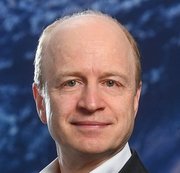
Trainer’s name: Andreas Rudolph
Trainer’s position: Engineer
Trainer’s email and phone number: Andreas.Rudolph(at)esa.int;
Andreas Rudolph, Engineer (M.Sc., University of Stuttgart/Germany) with 27 years of professional experience in space missions and operations.
joined the European Space Agency at ESTEC in 1991 as AOCS engineer,
moved to ESA’s control centre ESOC in Darmstadt in 1993 where he worked on several earth observation and then space science missions. Since 2008 he is Ground Segment Manager responsible for the ground segment and operations of all Astronomy and Fundamental Physics Missions operated by ESOC. He was Flight Director for Launch and Early Orbit Phases of several ESA Astronomy missions including Gaia and Lisa Pathfinder and deputy flight director for several other missions(including ESA’s recently launched Bepi-Colombo mission to Mercury).
Dr. Giovanni Santin
Trainer’s name: Dr. Giovanni Santin
Trainer’s position: ESA Space Environment and Effects analyst
Trainer’s email and phone number: Giovanni.Santin(at)esa.int; 0031715656267
Dr. Giovanni Santin works in the European Space Agency Environments and Effects section, where his focus is project support in the understanding of radiation-induced risks, uncertainties and solutions. He manages R&D covering radiation transport and innovative shielding, and he oversees the development of radiation monitors for Earth orbits and interplanetary missions. He studied Physics in Trieste, Italy, where he also obtained his PhD, studying neutrino oscillations in reactor and beam experiments. After two exciting periods at CERN, Geneva, and in Lausanne, he joined the ESA team in 2002. Since 2014 he is Honorary Visiting Fellow at the University of Leicester.
Dr. Christoph Schuy
Trainer’s name: Dr. Christoph Schuy
Trainer’s position: Postdoc Researcher GSI, Biophysics department, Dramstadt, Germany
Trainer’s email and phone number:c.schuy(at)gsi.de; Tel.: 06159-71-1558
Dr. Christoph Schuy graduated with a PhD (Dr. rer. nat) in physics from the Technical University of Darmstadt hosted by GSIs biophysics department in 2014. His main research focus as a PostDoc researcher in the Space Radiation Physics group of GSIs biophysics department is nuclear fragmentation experiments for particle therapy and space radiation protection. He has specialized mainly in cross section measurements and the development and verification of passive beam modulators for therapy and space applications.
Dr. Ulrich Straube
Trainer’s name: Dr. Ulrich Straube
Trainer’s position: Flight Surgeon, Radiologist, Radiation Protection
Trainer’s email and phone number: ulrich.straube(at)esa.int; 0049 2203 600141
Ulrich Straube, MD works as Operational Flight Surgeon at the ESA’s, Medical Operations and Space Medicine Office. He served as Prime Crew Surgeon for multiple Human Space Missions launched on STS (US Space Shuttle) to ISS (International Space Station), out of the USA, Russia and Asia (Soyuz).
Dr. Straube concluded his Flight Medicine Training at the German Luftwaffe, Institute of Aerospacemedicine, Fürstenfeldbruck in 1994. He joined the Medical Team at the European Astronaut Center, Cologne/Germany in 1999. Being assigned immediately to work to the NASA he moved to the USA and worked at the Johnson Spaceflight Center, JSC, Houston and the Kennedy Space Center, KSC, Cape Canaveral. After completion of the Aerospace-Medicine Short Course, University of Texas, Medical Branch, Galveston and serving as Flight Surgeon in Training at the JSC Flight Clinic, he received his certification as Crew- and Flight-Surgeon by the Multilateral Space Medicine Board, MSMB.
As former Clinical Radiologists and certified Physician for Radiation Protection, he leads the ESA Radiation Protection Initiative for Astronauts, HRE-OM, RPI at the European Astronaut Center.
Dr. Straube started his scientific outreach with MD thesis on MRI parameter calculations for tissue characterization and -grading in human brain tumours.
His current focus is on Radiation Protection of Space Crew and Radiation Risk from Ionizing Radiation in Space for Low Earth Orbit Missions and Space Explorations. Dr. Straube serves as designated PI for ESA’s Active Dosimetry and for further activities of ESA within the NASA’s ORION program/Artemis/EM-1.
Dr. Leonardo Surdo
Trainer’s name: Dr. Leonardo Surdo
Trainer’s position: ESA Project Scientist
Trainer’s email and phone number: E-mail:leonardo.surdo(at)esa.int; Telephone: +31(0)71 565 6181
Dr. Leonardo Surdo graduated with a M.Sc. in Medical Biotechnology and Molecular Medicine from the University of Bari in 2010 and with a M.Sc. in Space Sciences from the International Space University in 2012. He started his career at the European Space Agency in 2013 and currently works as project scientist for biology experiments on-board the International Space Station (ISS) and other microgravity platforms, including parabolic flights, sounding rockets and sub-orbital capsules. He works on defining the scientific requirements of space experiments ranging from cell biology, microbiology, radiobiology, plant biology, tissue engineering to life support systems for human spaceflight. He also provides support to the experiments’ payloads development and from 2018, he is supporting the coordination of research activities in the field of space radiation in the ESA Directorate of Human Spaceflight and Robotic Exploration.
Dr. Walter Tinganelli
Trainer's name: Dr. Walter Tinganelli
Trainer’s position: Clinical Radiobiology Group Leader GSI, Biophysics department, Darmstadt, Germany
Trainer’s email and phone number: w.tinganelli(at)gsi.de; +49 6159 1352
Dr. Walter Tinganelli studied Biotechnology at Naples University. After his Master of Science, he moved in Germany where he graduated in 2012 with a Ph.D. (Dr. rer .nat) from the Technische Universität Darmstadt hosted by the Biophysics department of GSI, Darmstadt.
In the following years, he worked in different particle therapy center around the world. First, he was for 2 years at the National Institute of Radiological Sciences, Chiba Japan, and then for 3 years, he worked at the Trento Institute for Radiological Sciences in Trento, Italy.
His research focuses on tumor hypoxia, treatment plan verification, 3D cell culture and, synthetic hibernation.
For more details about Dr. Tinganelli´s research, please visit the link below:
https://www.gsi.de/work/forschung/biophysik/forschungsfelder/clinical_radiobiology.htm
Dr. Moritz Wolf
Trainer’s name: Dr. Moritz Wolf
Trainer’s position: Post doctoral researcher at GSI
Trainer’s email and phone number:mo.wolf(at)gsi.de; +49 6159 71 2197
Dr. Moritz Wolf received his PhD degree in Physics at Technical University of Darmstadt, Germany, in 2018. During the course of his doctoral studies, he worked with the medical physics group of the department of bio physics at GSI to develop robust optimization strategies for the 4D treatment planning of moving targets. Since 2019, he has been working as a postdoctoral researcher at GSI to further investigate the application of robust optimization to conformal 4D carbon therapy.




